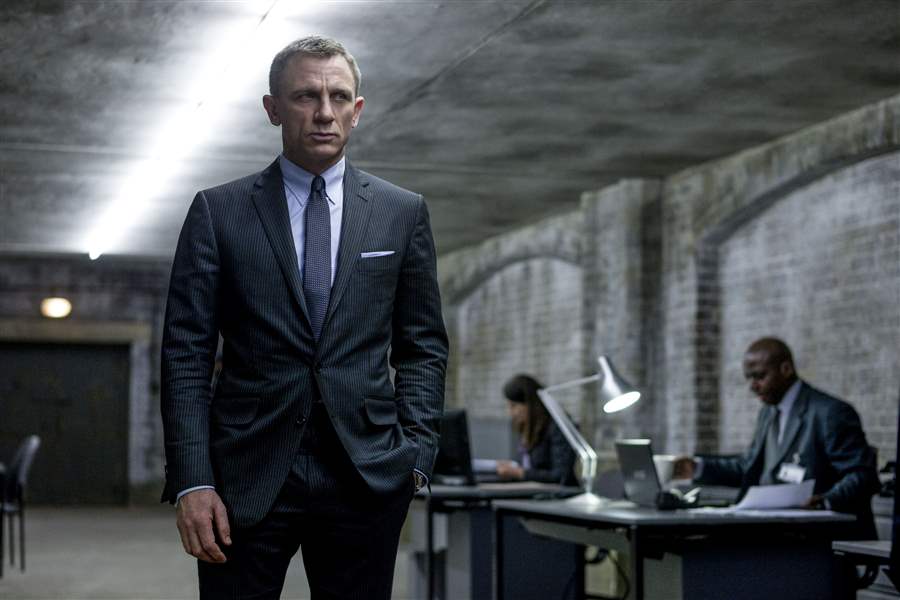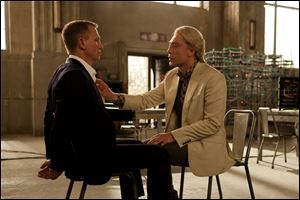
‘Skyfall' might be the best Bond movie yet
11/9/2012
ASSOCIATED PRESS
Mid-way through the breathtaking, pulse-pounding opening sequence to Skyfall, the third chapter in the Daniel Craig as James Bond series, it occurred to me that this might be the best beginning ever to any 007 film.
And after a few minutes watching Oscar-winning Javier Bardem's chips-all-in performance as new Bond menace Silva, I strongly considered this may indeed be the best Bond villain of all time.
And while I won't go so far as to declare Adele's title song as the best Bond theme of all time, I will confidently predict a better than 90 percent chance of it winning Best Original Song at next year's Oscars.
That's a lot of bests residing in the latest installment of this venerable film franchise, which recently celebrated its 50th year. But Skyfall may be the best of them all, an intelligent action film propelled not by shoot outs and fist fights, but by the intensity of its characters and their dramatic circumstances.
Skyfall's plot, as with all the best Bond movies, is easily distilled to a boiler plate: a villain's vendetta against his former boss. Silva, a former British super agent, is targeting M (Judi Dench), after she gave him up long ago in an operation gone bad. Scarred physically and mentally from his imprisonment and torture, Silva has spent years preparing his revenge, somehow claiming sole ownership of a small island on which to build a base, while amassing a small army of none-too-bright mercenaries to do his bidding. And being a former agent, he knows exactly how and where to strike MI6 to maximum effect.
There are no femme fatales or romantic dalliances for Bond (Daniel Craig) in this outing. The film is a twisted triangle involving M and her relationships with a favorite-turned-fallen agent and his 00 replacement.

Daniel Craig, left, and Javier Bardem in a scene from the film "Skyfall." Bardem portrays, Raoul Silva, one of the finest arch-enemies in the 50-year history of Bond films.
Silva is brilliant, focused, and lives as if he has nothing to lose. He's more than a worthy competitor for Bond, anticipating his every move as their identical training would dictate, and an interesting character. With his colorful but never comical performance Bardem confidently straddles the line between maniacal and melodramatic; this is what a studio gets when it ponies up for an accomplished actor, best known for his chilling killing machine in No Country for Old Men.
As Bond, Craig keeps emotions mostly out of view, providing glimpses of the humanity inside the agent only long enough to heighten the drama and the stakes. His Bond is a cold, efficient killing machine operating just this side of the law. Yet Bond doesn't miss the opportunity to coldly turn his back on the agency and his past, vanishing from the grid after a near-death experience. He is content enough with his new freedom on the fringe to make it a permanent lifestyle, but it's his infrangible sense of duty to country and M that brings him back to the fold when both are threatened.
But this is a new world he returns to, with increasing threats from within the organization — including political opportunist Gareth Mallory (Ralph Fiennes) who doubts Bond's abilities — as well as outside of it. Craig's scenes with Dench are particularly memorable and haunting, as both actors wordlessly convey a lengthy relationship built upon dedication to a cause and mutual respect, and the dysfunction and unease that comes when you can be terminated, literally, at any moment. There's a mother-son love between them, and a healthy distrust that comes along with their line of work.
Craig offers a real-world Bond, and more than any of those 007s before him, you believe in this British agent's mortality. When he gets out of a jam it's never so much a product of luck as it is training and an unflappable sense of control. This new era of Bond has reset the template for action heroes as flesh-and-blood mortals rather than chiseled demigods.
First-time Bond director Sam Mendes, who won an Oscar for the dark and cynical American Beauty, and explored corrosive love in Revolutionary Road, proves a brilliant choice to continue this humanizing of Bond, reining in the spectacle and gadgetry for an intimate action film.
As much as Casino Royale and Quantum of Solace functioned as introductions to Craig as Bond and the series' gritty new direction, Skyfall is about the state of the franchise and establishing its roots. If there is a singular theme for Mendes with this movie, it's that the Bond films require a proper foundation from which to build upon for a new generation of movies, especially now with Craig signed to several more 007 films, and he puts all the pieces in place for years of movies to come.
And with the help of cinematographer Roger Deakins, nine-time Oscar nominee for such movies as The Shawshank Redemption, Fargo, No Country for Old Men, and True Grit, Skyfall is a postcard-perfect film to watch, featuring action sequences that crackle with energy and enthusiasm.
Quibble here and there over a sequence or a subplot that occasionally drifts off course from Skyfall's narrowly focused story, but this is a film that roars with enthusiasm, guts, and a sense of freedom from genre conventions.
Is it the best Bond movie ever? Let the debates begin.